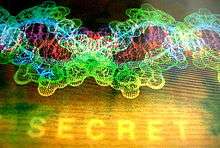Nanopunk
Nanopunk refers to an emerging subgenre of science fiction that is still very much in its infancy in comparison to its ancestor-genre, cyberpunk,[1][2] and some of its other derivatives.[3]

The genre is especially similar to biopunk,[4] but describes a world where nanites are widely in use and nanotechnologies are the predominant technological forces in society.
Currently the genre is mainly concerned with the artistic, psychological,[2] and societal impact of nanotechnology, rather than aspects of the technology which itself is still in its infancy. Unlike cyberpunk, which can be distinguished by a gritty and low-life yet technologically advanced character, nanopunk can have a darker dystopian character that might examine potential risks by nanotechnology as well as a more optimistic outlook that might emphasize potential uses of nanotechnology.[5][4]
Comics
- Scooby Apocalypse (2016–2019) reveals early on that a nanite virus originating from Velma's 'Elysium Project' experiment is the reason behind people becoming monsters.
Literature
- Kathleen Ann Goonan (Queen City Jazz – 1997) and Linda Nagata were some of the earliest writers to feature nanotech as the primary element in their work.[2]
- Another example of this genre is Neal Stephenson's The Diamond Age.[6] Some novels of Stanislaw Lem, including Weapon System of the Twenty First Century or The Upside-down Evolution, The Invincible and Peace on Earth as well as Greg Bear's Blood Music could also be considered precursors of nanopunk.
- Another example is the Michael Crichton novel Micro (2011). More recently, Nathan McGrath's Nanopunk (2013) is set in an icebound near-future where almost half the world's population has been wiped out. Alister, a child when "The Big Freeze" began is now a teenager in a society slowly finding its feet. Unaware of his nano-infection he sets out to find his lost sister and is joined by Suzie, a militant cyber-activist. Their hacking attracts the attention of Secret Services and a ruthless private military corporation and their search becomes a deadly race for survival.
- Linda Nagata's Tech Heaven (1995) is a futuristic thriller about Katie, a woman whose husband is about to die of injuries sustained in a helicopter crash. Instead of dying, he gets his body cryogenically preserved so that he can be reawakened when med-tech is advanced enough to heal him. The problem is that it winds up taking far more than the estimated few years for this to happen.[7]
- Alastair Reynolds' Chasm City could also be considered nanopunk.[8]
Film and television
Film
- Osmosis Jones (2001)
- Transcendence (2014)
- GI-Joe 1 movie has two fifth of nanopunk elements with spy-fi and other elements
- The Day the Earth Stood Still (2008 film)
Television
- Doctor Who S1E10 (2005)
- Generator Rex (2010–2013)
- Big Hero 6: The Series (2018)
- Altered Carbon (2018)
Video games
- Anarchy Online (2001)
- Crysis (2007–2013)
- Deus Ex (2000)
- Metal Gear Solid series
- Supreme Ruler 2020 (2008)
See also
References
- The Multiple Worlds of Fringe: Essays on the J.J. Abrams Science Fiction Series. 2014. p. 156. ISBN 978-0-7864-7567-4. Retrieved 20 May 2015.
- Newitz, Annalee (17 January 2008). "io9 Talks to Kathleen Ann Goonan About Nanopunk and Jazz". Retrieved 20 May 2015.
- "AZoNano - Nanopunk, Definition and Examples of Nanotechnology Based Nanopunk Speculative Science Fiction". AZoNano. Jun 12, 2007.
- "Nanopunk Science Fiction".
- Huereca, Rafael Miranda. "The evolution of cyberpunk into postcyberpunk - The role of cognitive cyberspaces, wetware networks and nanotechnology in science fiction" (PDF). Retrieved 19 May 2015. Cite journal requires
|journal=(help) - Sohn, Stephen Hong (2008). "Alien/Asian: Imagining the Racialized Future" (PDF). 33 (4). The Society for the Study of the Multi-Ethnic Literature of the United States (MELUS). Retrieved 19 May 2015. Cite journal requires
|journal=(help) - Newitz, Annalee (December 22, 2006). "Underrated SF Classic: Linda Nagata's "Tech Heaven" (review)". Wired News.
- Heikkilä, Ville (November 2013). "Restoration of identity from space in Alastair Reynolds's Chasm City" (PDF). Retrieved 19 May 2015. Cite journal requires
|journal=(help)